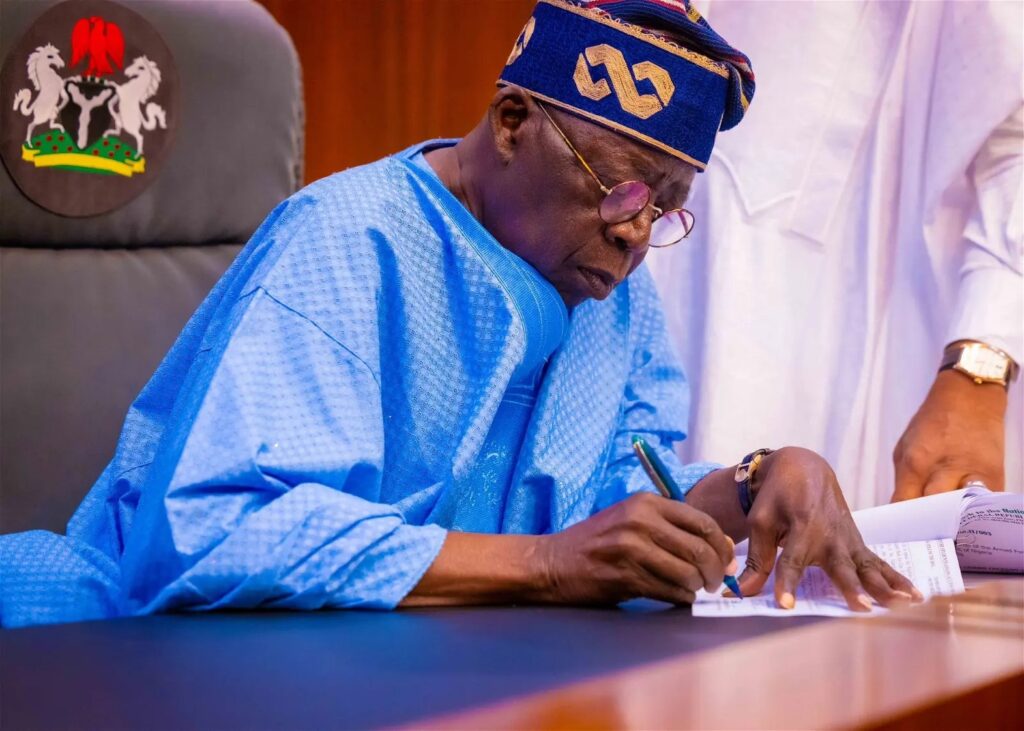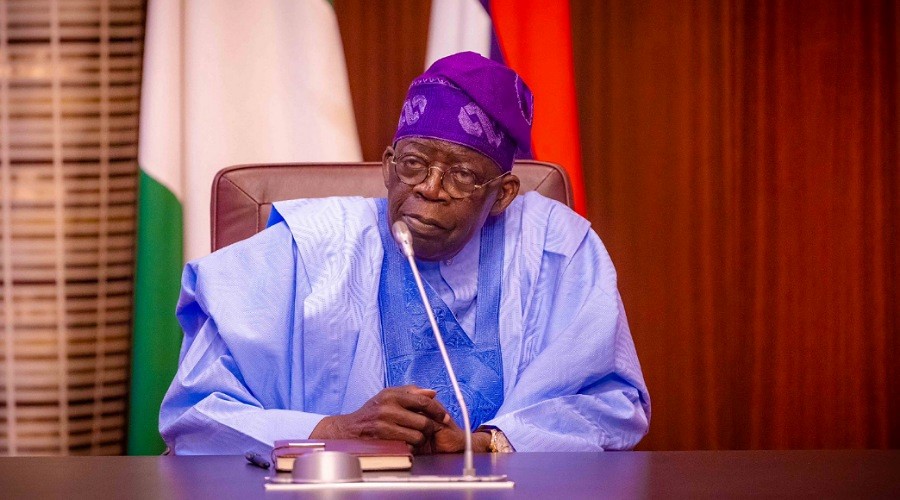Bola Tinubu’s assumption of the Nigerian presidency in 2023 marked a pivotal moment in the country’s political landscape. Born in 1952, Tinubu’s political journey began after working as an accountant in the United States. He made significant strides in Nigerian politics, serving as the Lagos State Governor and co-founding the influential All Progressives Congress (APC).
The 2023 presidential election saw Tinubu pitted against formidable opponents, including Atiku Abubakar of the People’s Democratic Party (PDP) and Peter Obi of the Labour Party. Tinubu’s campaign platform focused on addressing critical issues plaguing Nigeria, such as insecurity, economic challenges, and the need for significant infrastructure improvements.
President Bola Ahmed Tinubu assumed office on May 29, 2023, amidst high expectations and a range of economic challenges. His inaugural promise of “renewed hope” captured the essence of his presidency, which has been a mix of praise and criticism.
Economic Policies and Challenges
Tinubu’s economic policies have generated both optimism and concern. Notable among these policies is the removal of fuel subsidies and the adoption of a floating Naira exchange rate. While these measures were aimed at stabilising the economy, they have contributed to a significant increase in inflation, reaching 24.08% in July.
Additionally, the Central Bank of Nigeria’s decision to allow banks to sell forex at market-determined rates led to a sharp depreciation of the Naira in the parallel market, where it reached N915/$1 on June 14, 2023.

Tinubu’s 8-Priority Agenda
In a bid to address Nigeria’s socio-economic challenges, Tinubu’s government unveiled an ambitious 8-point agenda during the inaugural meeting of the Federal Executive Council. This agenda encompasses:
- Food Security
- Ending Poverty
- Economic Growth and Job Creation
- Access to Capital
- Improving Security
- Improving the Business Environment
- Rule of Law
- Fighting Corruption
These priorities outline a comprehensive strategy to tackle various issues plaguing Nigeria, from poverty to corruption.
On June 29, 2023, marking exactly one month since President Bola Tinubu took the oath of office as Nigeria’s 16th president, he sent a clear message during his inaugural speech that his administration would not follow the traditional path of business as usual. He conveyed his readiness to tackle the nation’s pressing issues head-on, distinguishing himself from the past practice of deferring challenges.
The President’s commitment to addressing economic bottlenecks was evident in his decisions, including the removal of fuel subsidies and the unification of various foreign exchange rates. While these actions garnered praise from financial markets and investors for their potential positive impact, they also raised concerns due to their repercussions, such as surging inflation, increased poverty rates, and job losses.
Here are some of the key policies and actions taken by President Tinubu during his first 30 days in office:
- Fuel Subsidy Removal: One of the prominent actions taken by the President was the removal of fuel subsidies. This move was motivated by the belief that fuel subsidies disproportionately benefited the wealthy while straining Nigeria’s finances. Immediately after this decision, the pump price of petrol increased significantly, resulting in an average price of N600 per litre, compared to the previous N185 per litre.
- Managing Labor: To address the potential backlash from labor unions following the fuel subsidy removal, President Tinubu’s administration engaged in discussions with labor representatives. The government promised to introduce palliatives, potentially including wage increases, to cushion the impact of the fuel price hike on workers.
- Suspension of the CBN Governor: The President suspended the Governor of the Central Bank of Nigeria (CBN), Mr. Godwin Emefiele, amid allegations of mismanagement and potential interference in politics. President Tinubu had previously expressed concerns about actions taken by the CBN under Emefiele’s leadership.
- Suspension of the EFCC Chairman: The Chairman of the Economic and Financial Crimes Commission (EFCC), Mr. Abdulrasheed Bawa, was also suspended during the President’s first month in office due to allegations of misconduct and abuse of office.
- Dissolution of Governing Boards: President Tinubu announced the dissolution of governing boards for all federal government parastatals, agencies, institutions, and government-owned companies. This move aimed to exercise the President’s constitutional powers and improve governance in these entities.
- Abolishment of Support for Professional Bodies: As part of cost-saving measures, the government notified professional bodies and councils that it would cease funding them in the 2024 budget. This decision aligned with recommendations from the Orosanye committee report and aimed to reduce government expenditures.
- Signing of Electricity Bill into Law: President Tinubu signed into law a bill that authorised states, companies, and individuals to generate, transmit, and distribute electricity. This law repealed the Electric Power Sector Reform Act (EPSRA) of 2005 and aimed to improve access to electricity using conventional and renewable energy sources.
- Signing of Student Loan Bill into Law: The President also signed the Student Loan Bill into law, enabling students to access loans for tuition fees. The law introduced conditions and requirements for granting these loans.
While President Tinubu’s first 30 days were marked by significant policy decisions, there are numerous challenges ahead:
- Forex Liquidity: Nigeria still faces a shortage of forex liquidity, which must be addressed through measures that boost dollar supply, such as reducing crude oil theft and encouraging non-oil exports.
- Palliatives for Poverty Alleviation: The government must develop measures and palliatives to alleviate the economic impact of fuel subsidy removal, particularly for vulnerable populations.
- Governance and Corruption: The fight against corruption and governance issues remains a challenge that requires continued attention to restore trust, strengthen democracy, and drive economic development.
- Inflation and Poverty: The removal of fuel subsidies and rising costs have led to inflation and increased poverty rates, necessitating strategies to mitigate these effects and protect vulnerable Nigerians.
- Job Losses: High energy costs could result in layoffs and unemployment, requiring measures to support businesses and maintain employment levels.
- Infrastructure and Institutional Reforms: Nigeria’s infrastructure and institutions need significant improvement to drive economic development and efficiency.
- Security: Addressing ongoing security challenges and promoting national cohesion are critical for stability and progress.
- Public Services and Welfare: Public services, particularly in healthcare and education, need attention and funding to improve their quality and accessibility.
- Debt Management: Nigeria’s rising debt levels need careful management to ensure sustainability and minimise reliance on borrowing.
- Electoral and Institutional Reforms: Electoral and institutional reforms are essential for fostering democratic participation and addressing irregularities in elections.
- Foreign Exchange Reforms: Continued reform of the forex market is necessary to stabilise the exchange rate and boost the economy.
- Youth Unemployment and Migration: Creating job opportunities and addressing disillusionment among the youth can help reduce illegal migration and brain drain.
In conclusion, President Tinubu’s first 30 days in office have been characterised by bold policy decisions and significant challenges. The success of his administration will depend on its ability to navigate these challenges, implement reforms effectively, and improve the overall well-being of Nigerians.
Expert Opinions
Financial experts have expressed varying views on Tinubu’s early presidency. Some believe that the 8-point agenda holds promise if effectively implemented. Notably, Tinubu’s administration has shown determination in tackling corruption and implementing radical policies across critical economic sectors.
However, challenges persist, particularly in achieving the ambitious goal of creating 50 million jobs, addressing the forex crisis, and reducing inflation.

Challenges and Controversies
While Tinubu’s presidency has been marked by these ambitious policy initiatives, it has not been without challenges. His campaign slogan “Emi lokan” sparked debate, and his choice of a Muslim running mate raised concerns. Additionally, rumours about his age and health circulated during the election season.
Tinubu’s first 100 days have been marked by tough decisions, with the removal of fuel subsidies and Naira floatation impacting the masses. These measures were taken to stabilize the economy, which faced considerable challenges.
In the short term, the government is urged to provide subsidy palliatives to mitigate the immediate impact on the people. The success of initiatives in agriculture, manufacturing, and SMEs sectors, along with the disbursement of loans, will play a crucial role in jumpstarting the economy.
Long-term plans include revenue generation through investments in sectors like oil and gas, mining, energy, and agriculture, with a focus on SMEs to promote homegrown businesses.
The government should also expedite efforts to provide alternative fuel sources, such as Compressed Natural Gas (CNG), to reduce transportation costs and create job opportunities.
While Tinubu’s 8-point agenda sets a promising direction, its success depends on effective implementation and collaboration with experts and professionals.
As Nigeria navigates its economic path under President Tinubu’s leadership, the hope is for sustained efforts, transparency, and tangible results in addressing the nation’s challenges and building a stronger and more prosperous future.
Sources
- https://dailypost.ng/2023/09/05/100-days-in-office-tinubus-policies-divide-financial-experts/#:~:text=As%20a%20solution%20to%20Nigeria’s,economic%20growth%20and%20job%20creation%3B
- https://www.thecable.ng/wikipedia-locks-tinubus-page-for-persistent-vandalism-after-age-is-edited-84-times
- https://www.thisdaylive.com/index.php/2023/07/04/assessing-president-tinubus-first-month-in-office
- https://www.channelstv.com/2023/06/20/tinubus-start-as-president-better-than-his-lagos-days-bode-george/
- https://www.semafor.com/article/09/05/2023/bola-tinubu-100-days




